Pioneer Valley disability activists reflect on path to equality
| Published: 07-14-2023 12:24 PM |
NORTHAMPTON — When Jeremy Macomber-Dubs was growing up, he was the first physically disabled person to attend his high school, with a wheelchair ramp having to be installed in the building. He has defied his condition, known as brittle bone disease, becoming a successful guitarist and playing in bands, but says his disability is inevitably a part of who he is.
“I spent most of my life hoping that people would see past my disability and maybe not even recognize it,” said Macomber-Dubs, who now chairs the Northampton Disability Commission. “But then as I got older, I realized it wasn’t helping me to act like I wasn’t disabled. In order for anything to change, I had to tell people my experiences. I had to be vocal about the inaccessibility everywhere I go. That’s basically why I felt the need to become an activist.”
Members of the Northampton Disability Commission and other Pioneer Valley residents gathered at the Northampton Senior Center on Tuesday, viewing a documentary on the disability rights activism of the 1960s and 1970s, as well as discussing what more needs to be done to support equality for those with disabilities.
The gathering came as the city of Northampton officially proclaimed July “Disability Pride Month,” noting that more than 10% of the city’s population has some form of disability and that people with disabilities remain at risk of discrimination and isolation.
“The city of Northampton and I urge all residents to recognize the contributions made by people with disabilities and create a more inclusive environment,” Mayor Gina-Louise Sciarra wrote in the official proclamation.
Those who gathered at the senior center on Tuesday viewed the documentary film “Crip Camp,” about the experiences of disabled youth at Camp Jened, a summer camp in New York state that existed from 1951 to 1977. Many who attended the camp, including Judy Heumann and James LeBrecht, would later become active in the disability rights movement begun in the 1960s.
The movement culminated in the passage of Section 504 of the Federal Rehabilitation Act of 1973, which decrees that any program receiving federal funding must accommodate people with disabilities, as well as the Americans with Disabilities Act of 1990, which prohibits discrimination based on disability.
Many who attended the screening noted much work still remains to be done.
Article continues after...
Yesterday's Most Read Articles
 A Waterfront revival: Two years after buying closed tavern, Holyoke couple set to open new event venue
A Waterfront revival: Two years after buying closed tavern, Holyoke couple set to open new event venue
 Services being held Thursday for Greenfield homicide victim
Services being held Thursday for Greenfield homicide victim
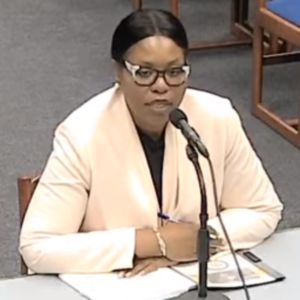 Island superintendent picked to lead Amherst-Pelham region schools
Island superintendent picked to lead Amherst-Pelham region schools
 Area property deed transfers, May 2
Area property deed transfers, May 2
 Granby Bow and Gun Club says stray bullets that hit homes in Belchertown did not come from its range
Granby Bow and Gun Club says stray bullets that hit homes in Belchertown did not come from its range
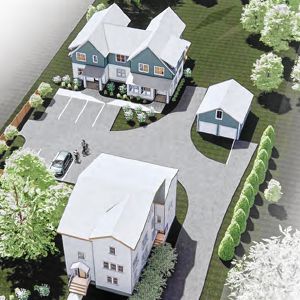 3-unit, 10-bed house in backyard called too much for Amherst historic district
3-unit, 10-bed house in backyard called too much for Amherst historic district
“I think it’s important for us to keep fighting,” said Myra Ross of Amherst. “There’s a lot with closed captioning. There’s a lot with having website accessibility. There’s a lot of streets that can’t be crossed.”
Lyn Horan, who serves as the vice chair of the Holyoke Disability Commission, said at the event that ongoing negative social attitudes toward people with disabilities shows progress toward achieving equality has slowed.
“It is not us restraining ourselves or even the diseases or accidents we incurred, it is society,” she said. “When it comes to community, they lose out if we’re not given the opportunity to share our gifts simply by giving us access.”
More positive media representation of people with disabilities is also needed, Macomber-Dubs said.
“Rarely have I seen a movie with a lead character that’s disabled. And if they are, they’re usually played by someone who’s not disabled,” he said. “I think one of our responsibilities as disabled people is to try to change that and put ourselves out there and make ourselves seen and listened to.”
Also attending the event were Northampton City Councilors Marianne LaBarge and Karen Foster. LaBarge serves on the city’s disability commission, while Foster is the executive director of All Out Adventures, a local nonprofit that provides outdoor excursions for people with disabilities.
Foster said that when she tells people about her work, they often assume she works with children. She said that people need to be reminded that adults with disabilities exist, and agreed with Macomber-Dubs’ sentiment that adult disabled people needed more representation.
“There’s this sort of popular mindset where we just think about kids as this extra portrayal,” she said. “It’s an encouragement to be out in the world, take up space, and we’ll remind people that adults have disabilities too and also deserve services and access.”
Alexander MacDougall can be reached at amacdougall@gazettenet.com.

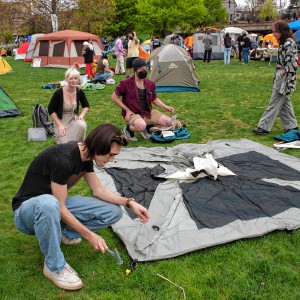 Pro-Palestinian encampment disperses at UMass, but protests continue
Pro-Palestinian encampment disperses at UMass, but protests continue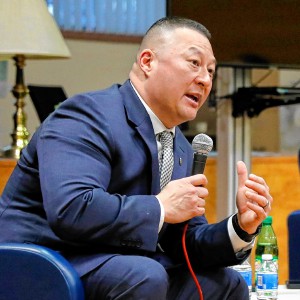 Amherst council confirms Gabriel Ting as police chief
Amherst council confirms Gabriel Ting as police chief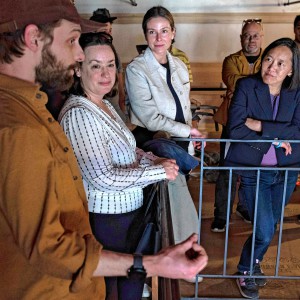 Music key to Northampton’s downtown revival: State’s top economic development leader tours city
Music key to Northampton’s downtown revival: State’s top economic development leader tours city 
